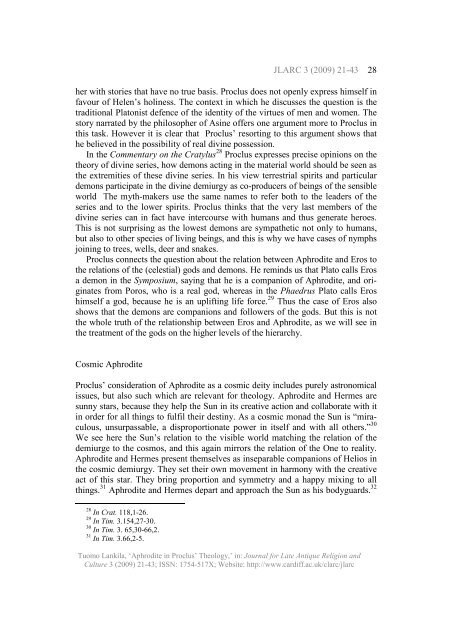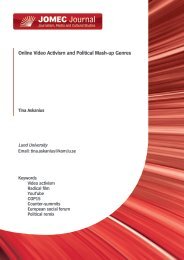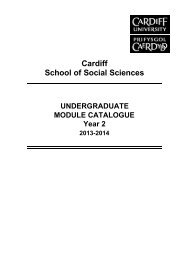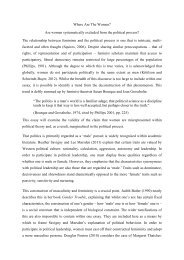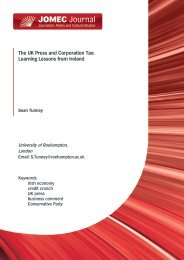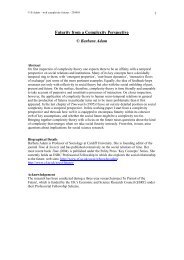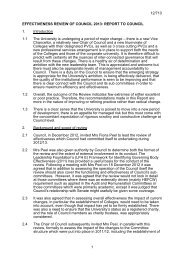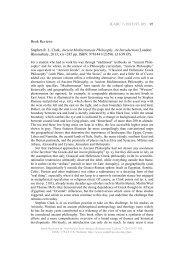APHRODITE IN PROCLUS' THEOLOGY - Cardiff University
APHRODITE IN PROCLUS' THEOLOGY - Cardiff University
APHRODITE IN PROCLUS' THEOLOGY - Cardiff University
Create successful ePaper yourself
Turn your PDF publications into a flip-book with our unique Google optimized e-Paper software.
JLARC 3 (2009) 21-43 28<br />
her with stories that have no true basis. Proclus does not openly express himself in<br />
favour of Helen’s holiness. The context in which he discusses the question is the<br />
traditional Platonist defence of the identity of the virtues of men and women. The<br />
story narrated by the philosopher of Asine offers one argument more to Proclus in<br />
this task. However it is clear that Proclus’ resorting to this argument shows that<br />
he believed in the possibility of real divine possession.<br />
In the Commentary on the Cratylus 28 Proclus expresses precise opinions on the<br />
theory of divine series, how demons acting in the material world should be seen as<br />
the extremities of these divine series. In his view terrestrial spirits and particular<br />
demons participate in the divine demiurgy as co-producers of beings of the sensible<br />
world The myth-makers use the same names to refer both to the leaders of the<br />
series and to the lower spirits. Proclus thinks that the very last members of the<br />
divine series can in fact have intercourse with humans and thus generate heroes.<br />
This is not surprising as the lowest demons are sympathetic not only to humans,<br />
but also to other species of living beings, and this is why we have cases of nymphs<br />
joining to trees, wells, deer and snakes.<br />
Proclus connects the question about the relation between Aphrodite and Eros to<br />
the relations of the (celestial) gods and demons. He reminds us that Plato calls Eros<br />
a demon in the Symposium, saying that he is a companion of Aphrodite, and originates<br />
from Poros, who is a real god, whereas in the Phaedrus Plato calls Eros<br />
himself a god, because he is an uplifting life force. 29 Thus the case of Eros also<br />
shows that the demons are companions and followers of the gods. But this is not<br />
the whole truth of the relationship between Eros and Aphrodite, as we will see in<br />
the treatment of the gods on the higher levels of the hierarchy.<br />
Cosmic Aphrodite<br />
Proclus’ consideration of Aphrodite as a cosmic deity includes purely astronomical<br />
issues, but also such which are relevant for theology. Aphrodite and Hermes are<br />
sunny stars, because they help the Sun in its creative action and collaborate with it<br />
in order for all things to fulfil their destiny. As a cosmic monad the Sun is “miraculous,<br />
unsurpassable, a disproportionate power in itself and with all others.” 30<br />
We see here the Sun’s relation to the visible world matching the relation of the<br />
demiurge to the cosmos, and this again mirrors the relation of the One to reality.<br />
Aphrodite and Hermes present themselves as inseparable companions of Helios in<br />
the cosmic demiurgy. They set their own movement in harmony with the creative<br />
act of this star. They bring proportion and symmetry and a happy mixing to all<br />
things. 31 Aphrodite and Hermes depart and approach the Sun as his bodyguards. 32<br />
28 In Crat. 118,1-26.<br />
29 In Tim. 3.154,27-30.<br />
30 In Tim. 3. 65,30-66,2.<br />
31 In Tim. 3.66,2-5.<br />
Tuomo Lankila, ‘Aphrodite in Proclus’ Theology,’ in: Journal for Late Antique Religion and<br />
Culture 3 (2009) 21-43; ISSN: 1754-517X; Website: http://www.cardiff.ac.uk/clarc/jlarc


